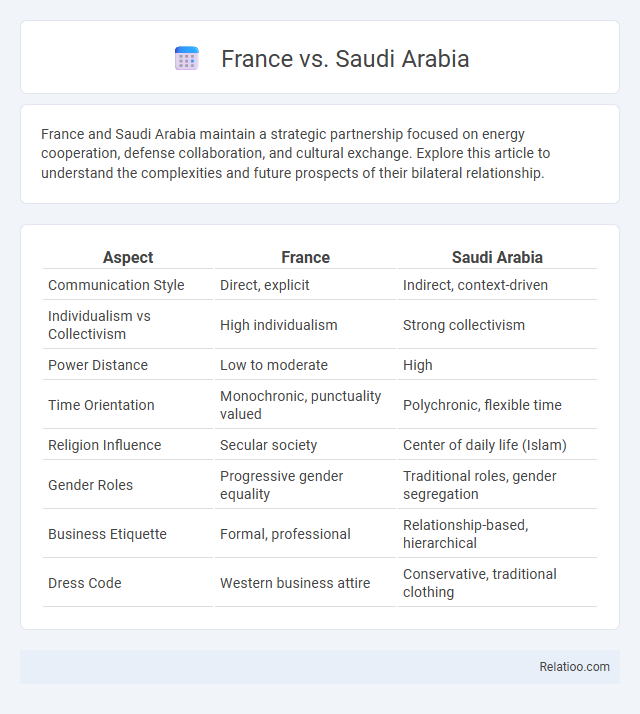France and Saudi Arabia maintain a strategic partnership focused on energy cooperation, defense collaboration, and cultural exchange. Explore this article to understand the complexities and future prospects of their bilateral relationship.
Table of Comparison
| Aspect | France | Saudi Arabia |
|---|---|---|
| Communication Style | Direct, explicit | Indirect, context-driven |
| Individualism vs Collectivism | High individualism | Strong collectivism |
| Power Distance | Low to moderate | High |
| Time Orientation | Monochronic, punctuality valued | Polychronic, flexible time |
| Religion Influence | Secular society | Center of daily life (Islam) |
| Gender Roles | Progressive gender equality | Traditional roles, gender segregation |
| Business Etiquette | Formal, professional | Relationship-based, hierarchical |
| Dress Code | Western business attire | Conservative, traditional clothing |
Introduction: Comparing France and Saudi Arabia
France and Saudi Arabia exhibit stark cultural contrasts in public display of affection, reflecting differing social norms and legal frameworks. In France, public affection such as kissing and hand-holding is widely accepted and seen as expressions of love and freedom. Conversely, Saudi Arabia enforces strict regulations influenced by conservative Islamic values, where public displays of affection are limited and can result in legal penalties.
Historical Backgrounds of France and Saudi Arabia
France has a long history of liberal attitudes towards public displays of affection (PDA), rooted in its Enlightenment values and cultural emphasis on individual freedom and artistic expression. Saudi Arabia's stance on PDA is deeply influenced by Islamic law and traditional social norms, where public affection is often restricted to preserve societal modesty and family honor. The contrasting historical backgrounds of France's secularism and Saudi Arabia's theocratic governance shape their divergent perspectives on public expressions of intimacy.
Political Systems: Democracy vs Monarchy
France operates under a democratic republic system characterized by elected representatives and multiparty elections, promoting individual freedoms including public displays of affection. Saudi Arabia, governed by an absolute monarchy with Sharia law foundations, restricts public displays of affection due to conservative cultural and religious norms. The contrasting political structures influence societal norms, where democratic France encourages personal liberties, while monarchical Saudi Arabia enforces stricter social codes.
Economic Strengths and Key Industries
France's economy excels in aerospace, luxury goods, and pharmaceuticals, with major companies like Airbus and L'Oreal driving global influence. Saudi Arabia leverages vast oil reserves and invests heavily in energy, petrochemicals, and emerging sectors through its Vision 2030 plan. Public display of affection norms impact tourism and retail sectors differently in each country, shaping consumer behavior and market dynamics in culturally significant ways.
Cultural Differences and Traditions
Public displays of affection in France are generally accepted and seen as a natural expression of love, reflecting the country's liberal and open cultural attitude. In Saudi Arabia, such displays are strictly regulated and often prohibited due to conservative Islamic traditions emphasizing modesty and public decorum. These stark cultural differences highlight how societal norms and religious beliefs shape acceptable behaviors in public spaces across both countries.
Education Systems and Innovation
France's education system emphasizes critical thinking and innovation, with strong investment in research and development fostering advanced technological growth. Saudi Arabia has rapidly reformed its education sector, integrating STEM programs and innovation hubs to diversify its economy beyond oil. Public display of affection remains culturally sensitive in Saudi Arabia, influencing educational discussions on social norms, whereas France's liberal approach supports open dialogue in educational curricula promoting social innovation.
Tourism Attractions in France and Saudi Arabia
France boasts iconic tourism attractions such as the Eiffel Tower, Louvre Museum, and the picturesque Loire Valley, which draw millions of visitors annually seeking rich history and culture. Saudi Arabia offers unique tourism experiences with landmarks like Al-Ula's ancient Nabatean tombs and the futuristic Riyadh cityscape, reflecting a blend of heritage and modernization. Your travel preferences may be influenced by differing cultural norms on public display of affection, which is widely accepted in France but more conservative in Saudi Arabia, impacting social interactions during your visit.
Foreign Relations and Global Influence
France's approach to public display of affection (PDA) reflects its liberal cultural values, which influence its foreign relations by projecting an image of openness and modernity, strengthening diplomatic ties with Western nations. Saudi Arabia enforces strict regulations on PDA aligned with its conservative religious and cultural norms, which shape its foreign policy by aligning closely with other conservative states and affecting its global influence through cautious social diplomacy. Understanding these cultural differences in PDA can help Your engagement strategies in international relations, fostering mutual respect and enhancing diplomatic effectiveness between Western and Middle Eastern countries.
Social Norms and Lifestyles
France exhibits a liberal approach towards public displays of affection (PDA), reflecting its cultural emphasis on personal freedom and romantic expression. In contrast, Saudi Arabia enforces strict social norms rooted in conservative Islamic values, where PDA is often restricted or discouraged in public spaces. These differing attitudes highlight the broader lifestyle contrasts, with France embracing openness in social interactions while Saudi Arabia prioritizes modesty and adherence to traditional customs.
Future Prospects and Challenges
France's progressive stance on public display of affection (PDA) contrasts sharply with Saudi Arabia's conservative cultural norms, presenting unique challenges for cross-cultural interactions and tourism. Your experience navigating PDA in these countries will require awareness of local laws and social expectations, especially as Saudi Arabia gradually opens up its public spaces under Vision 2030 reforms. Future prospects involve balancing modernization with tradition, fostering mutual respect while addressing legal restrictions and societal sensitivities around PDA.

Infographic: France vs Saudi Arabia
 relatioo.com
relatioo.com